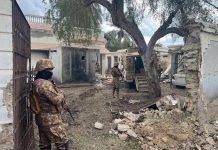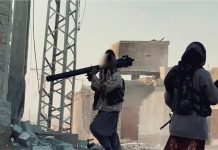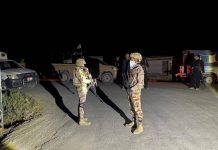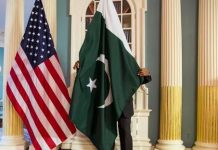During his one-day visit to Gwadar, Pakistani President Asif Ali chaired a meeting of government officials to discuss the law and order situation in Balochistan. The meeting focused on enhancing the capabilities of law enforcement agencies (LEAs), posting competent officers in Balochistan, and improving prosecution mechanisms to effectively counter ‘terror’ elements.
The Pakistani president emphasized that dialogue and negotiations are crucial for achieving peace and stability in Balochistan.
Several key officials attended the meeting, including Pakistan’s Interior Minister Mohsin Naqvi, Chief Minister Balochistan Sarfaraz Bugti, Home Minister Balochistan Ziaullah Langove, and Gwadar MPA Maulana Hidayat Ur Rehman. Senior civil and military officials, including Quetta Corps Commander Lt Gen Rahat Naseem, were also present.
President Zardari received a briefing on the overall security situation and the role of law enforcement agencies in countering ‘terror’ attacks across Balochistan. He was told that the measures taken by the LEAs have led to an improved security situation. He was also told that efforts are being made by the Balochistan government to eliminate threats to the safety of Chinese and other foreign nationals in the region.
Baloch nationalists, human rights activists, political and social workers, and student leaders repeatedly accuse law enforcement agencies and security forces of enforced disappearances in Balochistan. Enhancing the capacity of the LEAs will only worsen the law and order situation, not improve it, they would argue.
Notably, a day before Zardari landed in Gwadar, the Baloch Liberation Army (BLA) apprehended ten individuals, including Punjab residents, from Quetta. The BLA said it considers these detainees ‘suspicious’ and suspects them of being intelligence agents of Pakistan. If proven, appropriate action will be taken, the group said.
Related: 10 Abducted Including Punjab Residents, BLA Claims Responsibility
Addressing the gathering, Zardari stressed the need to enhance the prosecution mechanism to ensure that ‘terrorists’ cannot escape justice. He also advocated for equitable compensation for the families of security personnel who have been killed in various attacks throughout Balochistan.
Furthermore, Zardari called for measures to ensure the safety and security of Zaireen — the thousands of pilgrims who travel to religious holy sites in Iran and Iraq via the Taftan border.
Skill development for the people of Balochistan was another key focus. The Pakistani president emphasized the importance of producing skilled professionals to improve the socio-economic condition of the province. Chief Minister Bugti concurred, emphasizing the need to equip people, especially in border areas, to find employment opportunities both within Pakistan and abroad.
President Zardari also urged the promotion of Balochistan’s fishing industry and called for providing support and financing to local fishermen, promoting sustainable fishing practices, and addressing illegal fishing nets.
It’s worth noting that local fishermen in Balochistan’s coastal districts have repeatedly protested against rampant illegal trawling in coastal waters. They argue that unchecked trawling is harming aquatic life and depriving fishermen of their livelihoods.
The meeting also highlighted the importance of completing the Kachhi Canal project to meet Balochistan’s food requirements.
However, certain critical issues, such as enforced disappearances, ‘death squads,’ and the plight of thousands of missing Baloch individuals, were not discussed during the meeting.
Meanwhile, as Zardari was chairing the meeting, hundreds of protestors in Balochistan’s Kech district continued to demonstrate in sweltering heat since the first day of Eid, demanding the safe release of their loved ones.
Related: Families of Missing Baloch Persons Relocate Protest to DC Office Despite Obstacles
In Quetta, the Voice for Baloch Missing Persons (VBMP) completed its historic 5485th day of protest, advocating for the safe return of those who have disappeared. However, these issues were not deemed important to be included in the meeting agenda or discussed in the ensuing headlines.





























